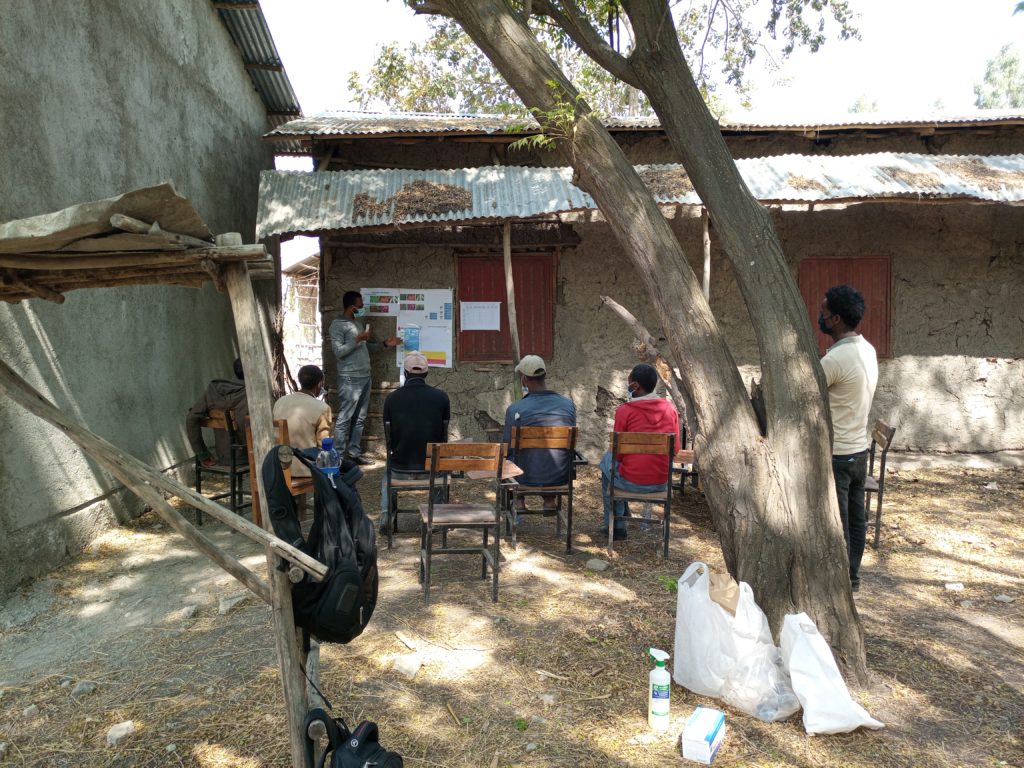Expanding the use of small scale irrigation in Ethiopia can improve farmers’ incomes, nutrition, and livelihoods, but sustainable growth hinges on careful governance of groundwater.
In Ethiopia, scientists with the Feed the Future Innovation Lab for Small Scale Irrigation (ILSSI) are launching fieldwork to engage farming communities in experiential learning processes to improve groundwater governance. This happens as small scale irrigation becomes increasingly popular and pressure on groundwater resources mounts. The approach, described as behavioral games, allows communities to experiment with possible future realities, strengthening their shared understanding of groundwater decisions and related consequences.
Water resources in Ethiopia are generally sufficient to sustainably expand irrigation, which could result in improved incomes and livelihoods for millions. But despite ample water resource potential, groundwater recharge might not be sufficient to meet the growing demand for water for irrigation. In the Ethiopian Highlands, for example, water levels in shallow wells fluctuate by 2 to 15 meters as the dry season advances, and most wells can only support irrigation during the first three months of the eight-month-long dry season.
That’s why, first of all, using groundwater in conjunction with surface water, where possible, is a sustainable approach to expanding small scale irrigation. Second, groundwater can be preserved through different tactics, such as by increasing recharge or using conservation agriculture practices that are more water efficient. Strong community governance of groundwater resources is also essential to ensure the best and most fair use of this precious resource.
Community governance of precious groundwater resources
The behavioral games approach has previously been used in India, Colombia and elsewhere to strengthen community governance of shared resources, including groundwater. Performed as collaborative, facilitated exercises, the games—and subsequent community-wide discussions reflecting on the process—support a community to build a shared understanding of how one farmer’s irrigation choices might limit their neighbor’s access to groundwater later in the season.

This understanding can help curb unintended overexhaustion of shared resources and increase collaboration on groundwater governance. In India, communities who participated in the games were significantly more likely to adopt rules governing groundwater use, compared to the communities that did not participate.
The approach has been adapted to fit the Ethiopian context, as explained by Hagar ElDidi, research analyst at the International Food Policy Research Institute (IFPRI):
“We take into account the types of water intensive- and water-saving crops that are common in these areas and consider the shallow groundwater levels in Ethiopia. From initial visits to the communities we had targeted, we found that their wells are usually quite shallow. When the water table falls, farmers dig deeper, but using pumps at this depth becomes too costly and farmers have to resort to using buckets, which is more labor intensive and therefore limits the size of their irrigated area to vegetable gardens only. All of this has implications for how groundwater can best be governed.”
Unlike in for example India, groundwater scarcity is not clearly visible, nor very alarming, in Ethiopia. At least not yet.
“Because small scale irrigation is expanding, now is a good time to increase farmers’ understanding of how they, through collective action, can prevent groundwater depletion in the future,” said ElDidi.
Playing community games to plant new perspectives
So far, the ILSSI team has carried out a preliminary test of the behavioral games approach in three villages, and the team of local collaborators and facilitators is currently in the field rolling out the games, community discussions, and related surveys in 15 villages around Butajra town and within the Southern Nations, Nationalities, and People’s Region. Another 15 villages will also be surveyed, although without playing the games, to provide a basis for comparison.
The use of groundwater for irrigation is a recent phenomenon in these areas, but has picked up particularly during the past five years, according to Fekadu Gelaw, assistant professor of Agricultural Economics, Institutional and Behavioral Economics at Haramaya University in Ethiopia, who leads ILSSI’s fieldwork.
“As a result, farmers have not yet faced a dramatic change in the groundwater level. None of the communities we have visited so far have any rules—informal or formal—about groundwater use, well digging, crop choice, investments by outsiders, and so on,” said Gelaw. “For now, the Ethiopian government is also promoting the extensive use of groundwater and even provides free motorized pumps to groups of farmers.”
Reflecting on exchanges with communities in the past weeks, Fekadu Gelaw indicated that before the experimental game was played, the majority of community members perceived that the increased use of groundwater for irrigation will have no effect on the groundwater level. Many even believed that groundwater level is not affected by the number of irrigators, nor by the type of crops grown through irrigation, and almost all community members believed that rules for groundwater use were unnecessary.
“All of this dramatically changes after the game,” noted Fekadu Gelaw. “The game seems to have triggered community members to think about an issue they have never thought of before. After the game, most propose establishing rules on groundwater governance, especially rules to regulate groundwater use by small scale investors that cultivate irrigated crops on land rented from community members.”
The fieldwork, which was permitted by the Ethiopian Public Health Institute (EPHI), is moving ahead in the coming weeks, with the ILSSI team taking all necessary measures to safely conduct the work despite the COVID-19 pandemic. The team supplies the necessary personal protective equipment to all individuals participating in the games, interviews, and discussions, encourages frequent use of hand sanitzer, and observes social distancing measures.
In six months, a round of follow-up visits to the communities is planned to examine to which extent the insights brought about by the games has an effect on groundwater governance over the long term.


